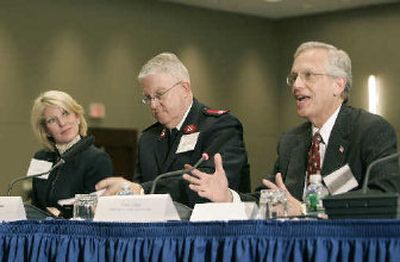Wal-Mart bank opposed

WASHINGTON — Allies for once, a stream of officials from the banking industry, unions and consumer groups urged federal regulators on Monday to reject a bid by Wal-Mart Stores Inc. to expand its empire into the banking business.
A company official, meanwhile, assured the Federal Deposit Insurance Corp. that Wal-Mart had no plans to compete with community banks, including bank branches located within its megastores.
The first day of the first-ever FDIC public hearings on a bank application drew a wave of opposition to the plans of the world’s largest retailer. Among the protesters: officials of trade groups representing banks of every type and size; unions; lawmakers; consumer and community organizations, and associations of convenience stores, grocers, retailers, real estate agents and farmers.
Wal-Mart’s bid for federal deposit insurance for a state-chartered bank in Utah — which would handle the 140 million credit, debit card and electronic check payments the company processes each year — is just the camel’s nose under the tent flap, the critics said. It would be counter to the company’s nature to refrain from expanding into full-scale banking with retail branches that would destroy local banks.
The lone Wal-Mart executive who testified — Jane Thompson, president of Wal-Mart Financial Services — insisted that the $250 billion-a-year retailer is a good corporate citizen in the communities where it operates, pays its employees fair wages and complies strictly with laws and regulations.
The company insists that consumers and retail banks have nothing to fear and is pledging to stay out of branch banking and consumer lending. Some 300 institutions operate branches in 1,150 Wal-Mart stores and the company says it doesn’t want to compete with them.
“Wal-Mart is absolutely and unequivocally committed not to engage in branch banking,” Thompson told FDIC Chief Operating Officer John F. Bovenzi and two other agency officials, seated at a dais in an auditorium before some 70 people.
The regulators probed with questions but gave no indication of a position on Wal-Mart’s bid.
“In fact and in practice, Wal-Mart is clearly committed to supporting community banking, not undermining it,” Thompson said.
Bentonville, Ark.-based Wal-Mart already is too big, opponents say, with 3,900 stores nearly saturating the U.S. market and unrivaled dominance — accounting for an estimated 10 percent of the U.S. retail economy. That means a Wal-Mart bank could pose a risk to the country’s financial system, and potentially to taxpayers, they say.
A few witnesses spoke in Wal-Mart’s favor: officials of the American Financial Services Association, which represents credit card issuers and other consumer lenders, and the Salvation Army and the National Center for Missing and Exploited Children.